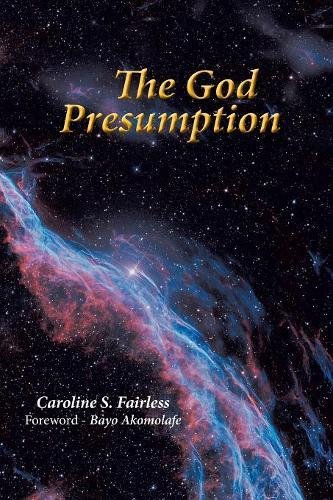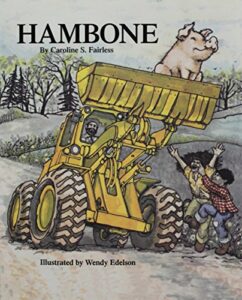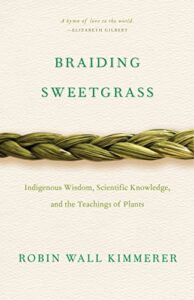The God Presumption received a 4+ star review, making it an IndieReader Approved title.
Following find an interview with author Caroline Fairless.
What is the name of the book and when was it published?
The name of my book is The God Presumption, and it was published by an indie press (Prose Press) in late fall of 2017. Its early days of public life coincided with a trip to S.C. (February) for family concerns, and my reader and proofreader Sally Z. Hare organized four book events for me. I share this because I didn’t have much time to retreat into my introverted nature before I had some good experiences around introducing this book, which is not an easy book.
What’s the book’s first line?
I am a woman who thrives when I am able to set the pace of my life and work at what my friend Megan calls “the speed of guidance”.
What’s the book about? Give us the “pitch”.
I think of this book structurally as a triple helix, each strand of which is woven with the devastation wreaked on this planet. The ecological health of the planet is the big picture, and the threads that interweave throughout The God Presumption tell at least one narrative of how we got here. It’s the story I am particularly suited to tell, I think, in that I was ordained in a mainline church almost thirty years ago. Ironically, this part of the story – the God part – seems to be the one that people don’t really want to engage; the conversation is a difficult one.
What inspired you to write the book? A particular person? An event?
I began the book – having no idea where I was headed – because I was frustrated and sickened by the linear, polarized conversations that seem to be our collective pattern at the moment; in my case, the conversation was “yes, God”, or “no, God.” There has been no middle ground, little to acknowledge that the world – the earth community and beyond – is sacred regardless of “yes, God” or “no, God.” I did not know where the writing of this book would take me; yet I had the confidence that I was the person who had the breadth and depth of experience to write it.
What’s the main reason someone should really read this book?
The God Presumption disengages itself from the institution of the Church, or any institution. It speaks to the reader who knows the world as spirit-filled (or yearns to know it in this way), yet has not turned to organized religion to navigate her/his spiritual path. Those of us who are coming to understand the many ways in which our early religious formation in fact is blocking us from our own “wayfinding” need to read this book.
And . . . The God Presumption names and calls out the connections between the western (white) European colonization of this country, and how they (I have to include my own heritage) built this country by broken treaties, lies, and on the backs of the African enslaved.
This book is for people who choose now to discover what was not available then (or still) in our educational and religious systems, who are able to embrace a work that lifts out the danger of the single narrative that drives Christian Americans (mostly white), those who know themselves entitled because of God-sanctioned scriptural formation.
I hope that The God Presumption reaches across many divisions of color, religion, politics, education, economics, anthropology, and more.
If they made your book into a movie, who would you like to see play the main character(s)?
The only two books (and the third of the trilogy yet to make an appearance) I think might make movies are my two children’s books: Hambone, and The Dance of the Caterpillars ~ In a Time Before Texting. I don’t know child actors at this time in my life. I imagine, and I hope with reason, that the stories themselves will invite the right people.
When did you first decide to become an author?
It fascinates me that I am not sure I ever decided to become an author. What I knew first was that I was assigned things. Then I wanted to write things. Little by little I came to discover that I couldn’t not write. Even now, when I have no brilliant ideas, I still need to write and am doing that, without having an agenda whatsoever.
Is this the first book you’ve written?
I was ten years old when I wrote my first story. My family and one other family had spent months on the island of Tahiti, missing a fair amount of the fall semester of fifth grade. My “make-up” task was to write a story. I wrote about many experiences (in pencil, on lined paper), and my favorite line was the last line, “It goes to show how wonderful the people, how beautiful the ocean, how many fish and sea urchins live off our reef, and how sad that beautiful teenagers are losing their teeth because they chew so much gum.”
In college I responded to an ad for a ghost writer, but I failed miserably because I didn’t do what I was paid to do. I enrolled in a creative writing class in my third year of college, and was told by the instructor that the class was “too evolved” for me, that my writing was too feminine.
This is the sixth book I’ve written (that has been published in one way or another). This statement does not include the three more or less written novels that sit in my basement filing cabinets. Not until The God Presumption have I been able to acknowledge the threads that connect all of them. The first is about Jeremy’s best friend, his pet pig Hambone; it is a story about Jeremy’s having to face into the economic realities of a working farm, a death and re-birth story, although I had no language for that at the time. The second (Children at Worship ~ Congregations in Bloom) has everything to do with a commitment to remain within the institutional church while developing multi-generational worship. The third is my first memoir, Confessions of a Fake Priest. Then (quite a few years later) The Space Between Church & Not-Church ~ A Sacramental Vision for the Healing of our Planet. I call it the “prequel” to The God Presumption. Between these books came The Dance of the Caterpillars~ in a time before texting, the second of the trilogy beginning with Hambone. The third is not yet written, although I have a vision, and the title is A Tree Called Once. In 2017 came The God Presumption.
What do you do for work when you’re not writing?
I am gratefully retired, after serving congregations for more than 25 years, until I no longer could. I grow most of our vegetables for year round consumption. I rescue and walk dogs. I day dream a lot, and have a few close friends, including my husband.
How much time do you generally spend on your writing?
If I am in the middle of a book, such as The God Presumption, most all of my time and attention is focused on the book, whether I am actually writing or not. On a good day, I might write for three hours. That does not include the copious notes I record on my cell phone when I am walking in the woods with our dogs. The challenge is to translate them later.
What’s the best and the hardest part of being an indie?
I have published traditionally, self-published, and published through an independent press. Even when I acknowledge the part of me who wants to be published by a HarperCollins, I still would rather publish independently. Indie publishing allows you to produce what you want, make it look how you want it to look, and go public with it in a timely manner. With The God Presumption I felt that its timeliness was top priority.
This may be a subtle difference but indie writers and indie publishers seem less competitive and far more supportive than their traditional counterparts.
I think the hardest part is the promotion/marketing. That said, I know quite a few writers who are continuing to publish traditionally, and they still are doing their own marketing, with a marketing plan in place before a contract. Indie publishing is expensive. For two years I referred to this as “my big fat sloppy book” because I couldn’t find the structure to make it work. I contracted with an indie editor, and that did cost!
What’s a great piece of advice that you can share with fellow indie authors?
I think it’s important to trust yourself, and, if, like me, you have to contract with an editor, then choose an editor you trust. I trusted the message of The God Presumption, but I can’t truthfully say that I knew it as good until the 5 star Indie Reader review. I am not yet confident enough so that bad reviews wouldn’t phase me much, and I love the indie philosophy that one can find at least a phrase or two in a review which can be used to gain a little traction.
Would you go traditional if a publisher came calling? If so, why?
I acknowledged above the piece of me that would still like to be picked up by a traditional publisher. That said, if an offer came, I am not at all certain I would say yes. I love being an indie writer. I feel as though I belong within a community that has never been able or never even desired to be “institutionalized.” The indie community is special, and although I imagine I am not alone in “poor country cousin” attitude, I have liked very much being in charge of my own writing. It would be costly on many levels to let that go; I feel it’s just beginning.
Is there something in particular that motivates you?
I want three things: I want to be known (and by that I don’t mean famous). I am not altogether sure what I mean by “I want to be known.” It has to do with respect, community, and invited to speak out for the good.
I want people to know that my particular ability to weave disparate threads and deepen the civic conversation is of critical importance in these times.
I yearn for invitations to speak – at colleges, for example, or retreat centers (Chatauqua, Omega Institute). I do not know how to accomplish this. My fantasy/dream is to be interviewed by Krista Tippett.
Which writer, living or dead, do you most admire?
This is a hard question! I think I would say the late Howard Zinn. I met him years ago, and have always been an admirer, always astonished at how much he learned, how well he put things together to tell an ever more complete narrative, and his deep commitment to social justice.
Which book do you wish you could have written?
I want to have written Braiding Sweetgrass by Robin Kimmerer, but I couldn’t have written that book. I will name, then, The View From Lazy Point by Carl Safina. His is a melodic, truthful, mystical narrative, and his understanding of what he calls “the whole enterprise”, is unsurpassed.
.



